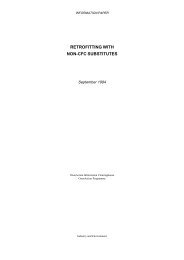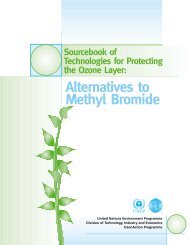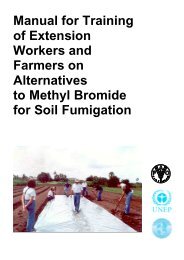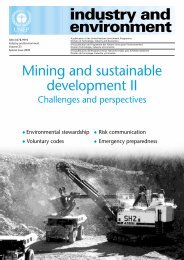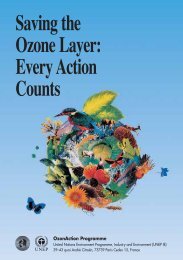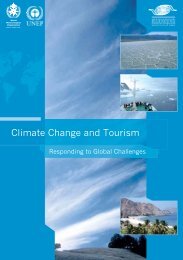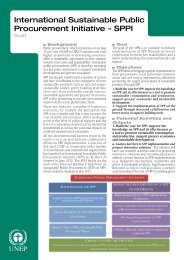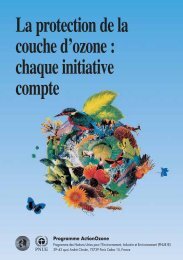industry and environment - DTIE
industry and environment - DTIE
industry and environment - DTIE
Create successful ePaper yourself
Turn your PDF publications into a flip-book with our unique Google optimized e-Paper software.
N e w s<br />
Measuring Your Company’s<br />
Environmental Impact: Templates<br />
<strong>and</strong> Tools for a Complete ISO<br />
14001 Initial Review<br />
Originally published in<br />
Swedish, Measuring Your<br />
Company’s Environmental<br />
Impact was designed <strong>and</strong><br />
written by <strong>environment</strong>al<br />
engineers. It has already<br />
been used by consultants<br />
<strong>and</strong> companies in Europe.<br />
This step-by-step manual<br />
makes available tools for<br />
carrying out complete company-wide <strong>environment</strong>al<br />
reviews, as a prerequisite for introducing<br />
an <strong>environment</strong>al management system in accordance<br />
with ISO 14001 or the European Eco-Management<br />
<strong>and</strong> Audit Scheme (EMAS). The<br />
accompanying CD-ROM includes: a template for<br />
an <strong>environment</strong>al review; an inventory tool to calculate<br />
emissions <strong>and</strong> the impacts of transportation,<br />
energy consumption <strong>and</strong> other activities; <strong>and</strong><br />
materials for carrying out an <strong>environment</strong>al failure<br />
mode <strong>and</strong> effects analysis (FMEA).<br />
Matts Zackrisson, Gunnar Bengtsson <strong>and</strong> Camilla<br />
Norberg (2004). Earthscan, 8-12 Camden High<br />
St., London, NW1 0JH, United Kingdom, Tel: +44<br />
20 7387 8558; Fax: +44 20 7387 8998; E-mail:<br />
earthinfo@earthscan.co.uk; Internet: www.earthscan.co.uk.<br />
Pbk. 137p. ISBN 1-84407-054-9.<br />
Raising the Bar: Creating Value<br />
with the United Nations Global<br />
Compact<br />
Raising the Bar is a comprehensive reference guide<br />
produced by an international team of experts. It<br />
responds to the need for practical knowledge<br />
(tools, case studies, <strong>and</strong> other types of information<br />
<strong>and</strong> resources) related to the Global Compact’s 10<br />
principles. The title refers to the situation businesses<br />
face when stakeholders “raise the bar” of<br />
expected performance to correspond to universal<br />
principles. Published to coincide with the UN<br />
Global Compact Leaders Summit in New York in<br />
June.<br />
Claude Fussler, Aron Cramer <strong>and</strong> Sebastian van<br />
der Vegt, eds. (2004). Greenleaf Publishing Ltd.,<br />
Aizlewood Business Centre, Aizlewood’s Mill, Nursery<br />
Street, Sheffield S3 8GG, UK, Tel: +44 114 282<br />
4375, Fax: +44 114 282 3476, E-mail: info@greenleaf-publishing.com,<br />
Internet: www.greenleaf-publishing.com.<br />
Pbk., 236p. ISBN 1-874719-8-29.<br />
Corporate Social Opportunity!<br />
7 Steps to Make Corporate Social<br />
Responsibility Work for Your<br />
Business<br />
Businesses need to be made aware of the opportunities<br />
that Corporate Social Responsibility (CSR)<br />
provides for developing new products <strong>and</strong> services,<br />
new markets <strong>and</strong> new business models. Corporate<br />
Social Opportunity! proposes a practical<br />
seven-step process to help business leaders assess<br />
CSR’s impact on their strategies <strong>and</strong> operations<br />
<strong>and</strong> to discover opportunities in their own companies.<br />
Instead of a “bolt on”, CSR can become a<br />
valuable “built in”.<br />
David Grayson <strong>and</strong> Adrian Hodges (2004).<br />
Greenleaf Publishing (see above). Pbk., ISBN<br />
1874719837. (Also available in hardback.)<br />
Eco-efficiency <strong>and</strong> Beyond:<br />
Towards the Sustainable Enterprise<br />
This collection of papers developed out of two<br />
conferences on eco-efficiency held in Düsseldorf<br />
in 1998 <strong>and</strong> 2001. Eco-efficiency <strong>and</strong> Beyond looks<br />
at eco-efficiency’s past <strong>and</strong> present <strong>and</strong> stresses the<br />
need for comprehensive uptake of the eco-efficiency<br />
concept by business, government <strong>and</strong> consumers<br />
as soon as possible. The challenge of<br />
sustainable development will not be met “in slow<br />
motion”. Policies that offer companies serious<br />
incentives for innovative behaviour are urgently<br />
needed. The editors are from the Wuppertal (Germany)<br />
Institute for Climate, Environment <strong>and</strong><br />
Energy.<br />
Jan-Dirk Seiler-Hausmann, Christa Liedtke <strong>and</strong><br />
Ernst Ulrich von Weizsäcker, eds. Greenleaf Publishing<br />
(see above). Hbk., 248p. ISBN 1-874719-<br />
60-8.<br />
Learning to Talk: Corporate<br />
Citizenship <strong>and</strong> the Development<br />
of the UN Global Compact<br />
Learning to Talk is a collection<br />
of key writings about the UN<br />
Global Compact by some of<br />
the leading actors in its development<br />
to date. UN Secretary-General<br />
Kofi Annan has<br />
contributed the Foreword. In<br />
1999 it was Kofi Annan who<br />
first proposed such a compact<br />
at the Davos World Economic<br />
Forum. Officially launched in July 2001, the<br />
Global Compact is a set of nine voluntary UN<br />
principles for business covering <strong>environment</strong>al,<br />
human rights <strong>and</strong> labour issues. A tenth principle,<br />
on corruption, was added during the UN Global<br />
Compact Leaders Summit in New York in June of<br />
this year. Publication of Learning to Talk coincided<br />
with that meeting.<br />
Malcom McIntosh, S<strong>and</strong>ra Zaddock <strong>and</strong> Gerog<br />
Kell, eds. (2004) Greenleaf Publishing (see above).<br />
Hbk., 432p. ISBN 1874719756.<br />
Environmental Policy <strong>and</strong><br />
Technological Innovation:<br />
Why Do Firms Adopt or Reject<br />
New Technologies?<br />
This book demonstrates how behavioural models<br />
can be applied to underst<strong>and</strong> better why companies<br />
adopt clean technologies. There is an analysis<br />
of the findings of a case study on companies located<br />
in northern Mexico, where inputs required for<br />
production are temporarily imported. The conclusions<br />
are relevant to industries in other parts of<br />
the world with different modes of operation. The<br />
author is Senior Advisor in Science <strong>and</strong> Technology<br />
Policy to the Netherl<strong>and</strong>s Organization for<br />
Applied Scientific Research (TNO). Environmental<br />
Policy <strong>and</strong> Technological Innovation is part of<br />
the “New Horizons in the Economics of Innovation”<br />
series.<br />
Carlos Montalvo Corral (2002). Edward Elgar<br />
Publishing Ltd., Glens<strong>and</strong>a House, Montpellier<br />
Parade, Cheltenham, Glos GL50 1UA, United Kingdom,<br />
Tel: +44 1242 226 934; Fax: +44 1242 262<br />
111; E-mail: info@e-elgar.com; Internet: www.<br />
e-elgar.uk. Hbk., 304p. ISBN 1-84064-957-7.<br />
The Materiality of Social,<br />
Environmental <strong>and</strong> Corporate<br />
Governance Issues to Equity<br />
Pricing: 11 Sector Studies by<br />
Brokerage House Analysts at<br />
the Request of the UNEP Finance<br />
Initiative Asset Management<br />
Working Group<br />
This report summarizes the results of a project<br />
conceived <strong>and</strong> implemented over 14 months in<br />
2003/4 by a public-private partnership between<br />
UNEP <strong>and</strong> a group of 12 asset management<br />
firms. The project’s purpose was to explore <strong>and</strong><br />
document the financial materiality of <strong>environment</strong>al,<br />
social <strong>and</strong> corporate considerations <strong>and</strong><br />
criteria as they relate to the investment management<br />
of mutual, pension <strong>and</strong> other institutional<br />
funds. Project results show that these funds’ owners<br />
<strong>and</strong> managers may be exposing themselves to<br />
unnecessary financial risks (<strong>and</strong> missing out on<br />
opportunities) if they do not consider <strong>environment</strong>al,<br />
social <strong>and</strong> governance criteria in investment<br />
procedures.<br />
(2004). UNEP FI (Finance Initiative), International<br />
Environment House, 15 chemin des Anémones,<br />
CH-1219 Châtelaine, Geneva, Switzerl<strong>and</strong>,<br />
Tel: +41 22 917 8178; Fax: +41 22 796 9240, E-<br />
mail: fi@unep.ch; Internet: www.unepfi.net. This<br />
publication can be ordered from Earthprint Ltd.,<br />
PO Box 119, Stevenage SG1 4TP, UK, Tel.: +44<br />
1438 748 111; Fax: +44 1438 748 844; E-mail:<br />
orders@earthprint.com; Internet: www.earthprint.com.<br />
Pbk., 52p.<br />
Values to Value: A Global<br />
Dialogue on Sustainable<br />
Finance<br />
The UNEP Finance Initiative’s Values to Value<br />
(V2V) report was published just before the UN<br />
Global Compact Leaders Summit in June.<br />
Designed as a living document, or a “work in<br />
progress”, it is a ring binder in which papers <strong>and</strong><br />
conference proceedings are collected. Additional<br />
documents in the same format will be made available<br />
to users in the future. Thematic sections<br />
include “Sustainability Management, Reporting<br />
<strong>and</strong> Indicators”, “Civil Society Perspectives on<br />
Sustainable Finance”, “Asset Management”, “Climate<br />
Change” <strong>and</strong> regional initiatives. The<br />
accompanying CD-ROM contains the report in<br />
pdf format, as well as many other related docu-<br />
UNEP Industry <strong>and</strong> Environment April – September 2004 ◆ 83



